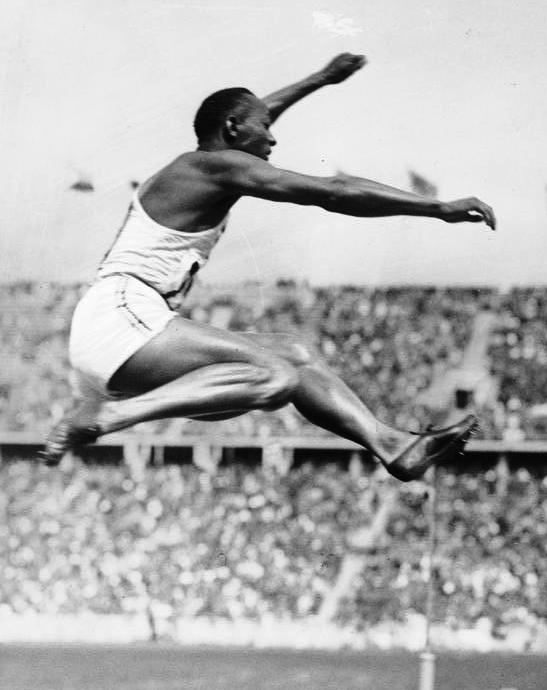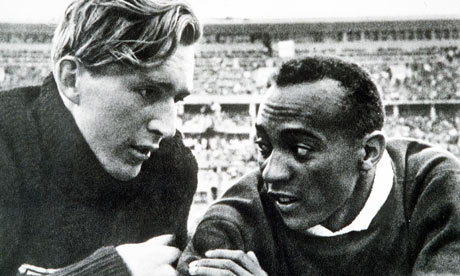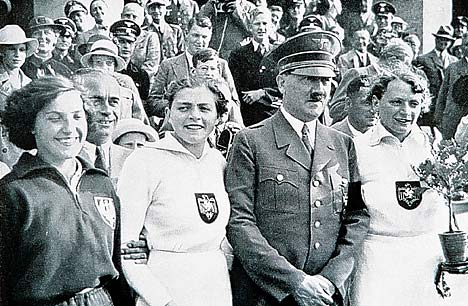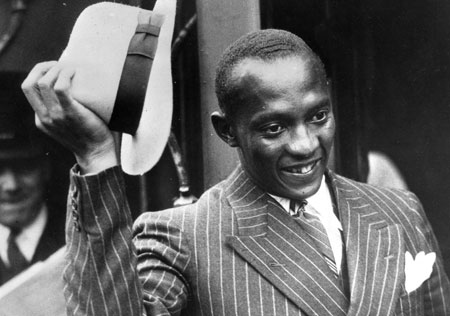
USA OLYMPIAN JESSE OWENS:
WAS HE A VICTIM OF NAZI RACISM,
OR AMERICAN RACISM?

During the summer of 1936, the people of Berlin were proud to have the honor of hosting the Summer Olympics. Though the country was in the middle of its tireless campaign against the Jewish people and well on its way to war, the event of hosting the games was a glowing chance for Nazi Germany to convince the world that it was a peace-loving, tolerant country, and not one overrun by extremist regime or racial hatred. However, good intentions aside, the German-hosted games were an infamously memorable display of propaganda at its finest, littered with elitism (Info Please). The Nazis just knew that these Games would prove to the world once and for all who the superior race was, in terms of physical strength and mental ability. The major problem with this plan was that not all of the German people agreed with the Nazi mentality, and as an added bonus, Nazi athletes were dominated in certain categories by an American man that their leaders considered "sub-human" and "inferior": Jesse Owens. When Owens would go on to prove top competitor and snag the gold medal in several events, it was a proud moment. It was also a moment that received more praise in the supposed "racist" country of Berlin than it did in Owens' home country of America (Wikipedia). To the warped media that inflated stories of negativity between Owens and Adolf Hitler, Owens responded by defending Hitler and denying the malicious stories. But the media, along with rocky American society, continued to keep the lie alive.

One of ten African-American athletes participating on the American team that year, Owens collected a number of gold medals - four, to be exact - and shattered records in running categories. Specifically, Owens placed first in the 100m and 200m relays, as well as the long-jump and 4 x 100m events (Wikipedia). In a country where peddling ideas of Aryan superiority was the norm, to witness a black athlete crushing the competition was not the most humble defeat for the Nazis. In the long-jump event, Owens began with poor luck. He had fouled his first two jumps, and one of which was actually a practice jump that was not meant to be counted. Feeling the looming sense of defeat, Owens caught a break as his German competitor, Luz Long gave him a tip that would dramatically alter the outcome of the event (ESPN). Accepting Long's advice to start a bit before the takeoff board, Owens landed a qualifying jump that propelled him to win the gold medal for the event.

[Luz Long and Jesse Owens at the 1936 Olympic Games.]
The 200m dash on August 7th, 1936 was meant to be Owens' last contribution to the Games, but he was entered to compete in the 4 x 100m relay after Nazi officials urged the American team to replace its two Jewish members, so as not to further upset Nazi spectators (NPR). While it's safe to say that the Nazis were pleased to see less Jewish-Americans on the playing field, accepting several astonishing defeats from a talented African-American athlete was probably not regarded as an even trade in their eyes. German fans, however, fully supported Owens' success, cheering him on after every history-making performance. Oddly enough, Owens was treated to more of a celebrity status in Germany than in America as a result of his Olympic fame. Upon returning to the States after his glorious collection of wins, Owens did not receive the warm reception and praise that he did while competing in Nazi Germany. Much of American society was still adjusting to the fact that non-White people were, indeed, people, and the racial intolerance was made evident when Owens was treated like nothing after becoming an accomplished Olympian.
Despite coming into a good amount of success and well-regard amongst German citizens, the media - which may or may have not been fueled by the fires of Nazi propaganda - proclaimed that not everyone was proud of Owens' accomplishments. In particular, speculation was that Owens had been royally snubbed by Adolf Hitler in a purposeful attempt to downplay his athletic superiority (About: German Myths). Numerous accusations ran rampant, trying to highlight the fact that Hitler very obviously gave the American athlete the cold shoulder for putting the Aryan race to shame. Many onlookers insisted that Hitler would spitefully leave the stadium well before any performance by Owens, to serve as a red flag of his disagreement in "nonhumans" to compete in the Games. On most of the occasions, it was simply scheduled for Hitler to leave the stadium at certain points to pursue matters elsewhere. At any rate, Germany won the Olympics that year, so he had nothing to worry about, let alone losing a race to Jesse Owens. Owens openly defended Hitler against the accusations numerous times. On Hitler's departure of the stadium, he said, "“Hitler had a certain time to come to the stadium and a certain time to leave. It happened that he had to leave before the victory ceremony after the 100 meters. But before he left I was on my way to a broadcast and passed his box. He waved at me and I waved back. I think it was bad taste to criticize the ‘man of the hour’ in another country.” (The Pittsburgh Press)

What is most disturbing about the story is not the possibility of disrespectful racism and poor sportsmanship, but the fact that the whole event of Owens being in any way "snubbed" by Hitler is a complete lie. As if Hitler's word wasn't always considered golden, even Owens denies that the Nazi leader did anything to offend him at the 1936 Olympic Games. Yes, it is true that Hitler did not congratulate any of the athletes on the day of one of Owens' wins, but he did so out of Olympic neutrality after he was warned by the Olympic Committee not to take sides (History News Network). Owens paints a much different picture of the situation than the media. In Owens' version of history, Hitler was, for once, not the monster that the world knew and feared. At one point during the games, the two allegedly waved at one another. When asked about the account, Owens commented "When I passed the Chancellor, he arose, waved his hand at me, and I waved back at him.” (Institute for Historical Review) Owens showed more disappointment with the American president than with Hitler. He stated, "When I came back to my native country, after all the stories about Hitler, I couldn't ride in the front of the bus." That's quite a big difference from the treatment he received in a supposedly intolerant country. The media painted a picture of a racist Hitler making a spectacle of his hatred for all to see, when in reality, it was all a lie to cover the tracks of America's indifferent attitude towards blacks.
When Owens returned to the United States after his glorified time in Germany, he was not offered the heroic treatment and rewards that the white Olympic athletes of his time received (Jesse James Biography). He was not offered any contracts or endorsements, and was basically disregarded as an American hero and thrown to the side to fight his way through a racist society. While he was not ultimately surprised by public reaction, he was particularly bothered at the President's blatant indifference to his accomplishments. Owens said, "Hitler didn't snub me - - it was FDR who snubbed me. The president didn't even send me a telegram." In further comment of the distasteful reception of the American elite, Owens mentioned, "I had to go to the back door. I couldn't live where I wanted. I wasn't invited to shake hands with Hitler, but I wasn't invited to the White House to shake hands with the president, either."

Shamelessly shunned by a country he called home, Owens post-Olympic life gave not even a hint to the success he once enjoyed abroad. Completely underrated by his entire country and president, he resorted to taking basic jobs to make a living. He dabbled in a number of businesses, trying anything necessary to make ends meet for his family (PBS). Owens would make little money racing against dogs and horses amongst other odd jobs. He stated "People say that it was degrading for an Olympic champion to run against a horse, but what was I supposed to do? I had four gold medals, but you can't eat four gold medals. There was no television, no big advertising, no endorsements then. Not for a black man, anyway." (WikiQuote)
However, he did find a bit of happiness when he became a playground director in Cleveland. Given his horrendous treatment by the American people, Owens was excited to step into a new chapter of his life in which he inspired youth and many others to disregard personal hardships, and stay determined to succeed. Though he himself did not benefit much from his Olympic accomplishments, he was at least enabled to use his experiences to enlighten those he spoke to. Owens eventually became a very highly-regarded public speaker, and even worked in accordance to the United States Olympic Committee (Jesse Owens).
While it's a wonder that Owens did end up financially surviving his return to the United States, it does not deter from the fact that his media situation was not unique, nor was it a mistake. It was a deliberate and vile attempt to keep races separated not only physically, but in terms of an equal mentality as well. The truth of the matter is that the only foul exchange did not occur between Adolf Hitler and Jesse Owens. It occurred between an evolving society and a stubborn upper class, one that did not believe in racial equality or freedom of all men. The media circus unleashed by assumptions that a Nazi leader deliberately shunned a black athlete simply for winning a competition was a display of propaganda at its finest. Owens knew it, Hitler knew it, and those with common sense recognize the lunacy of this situation today.
RELEVANT SOURCES & ARTICLES
Jesse Owens (Biography)
The 1936 Berlin Olympics (History Learning Site)
Owens Pierced a Myth (ESPN)
When Owens Beat Hitler, and the Olympics Changed
Jesse Owens (Wikipedia)
The Real Story of Jesse Owens and the 1936 Olympics (America Blog)
Jesse Owens (Official Website)
Jesse Owens: Myth and Reality (IHR)
VIDEOS